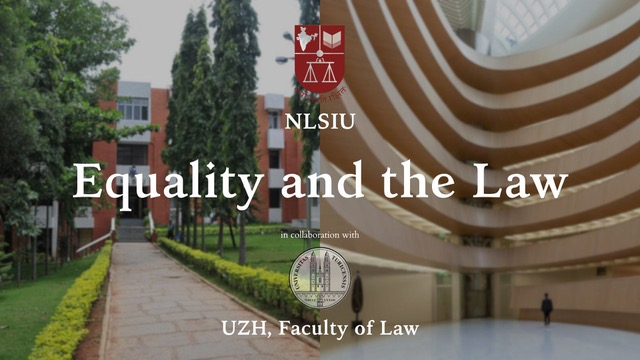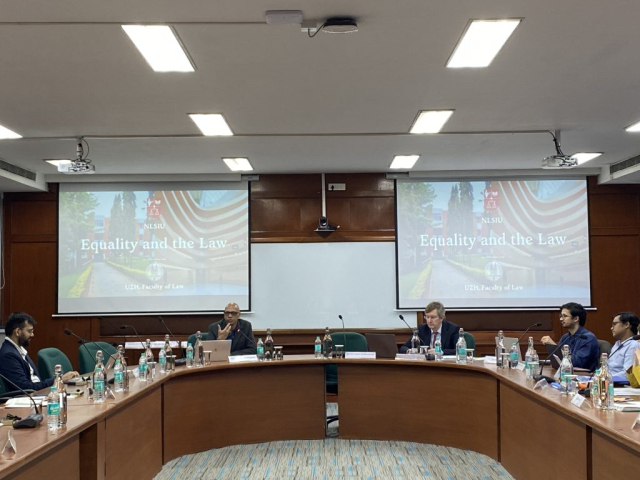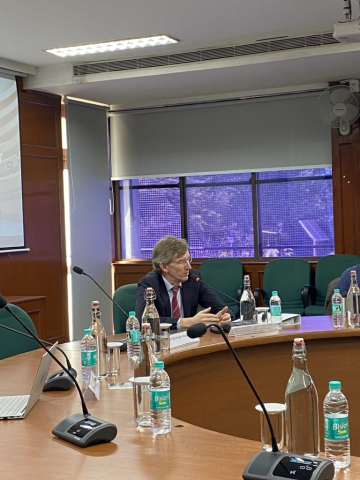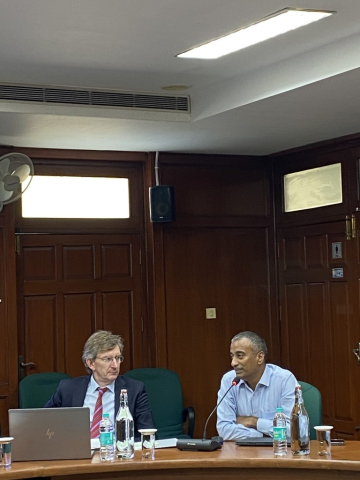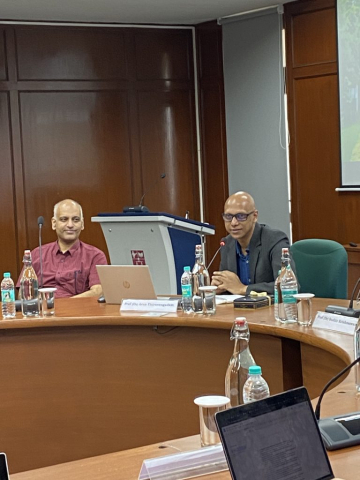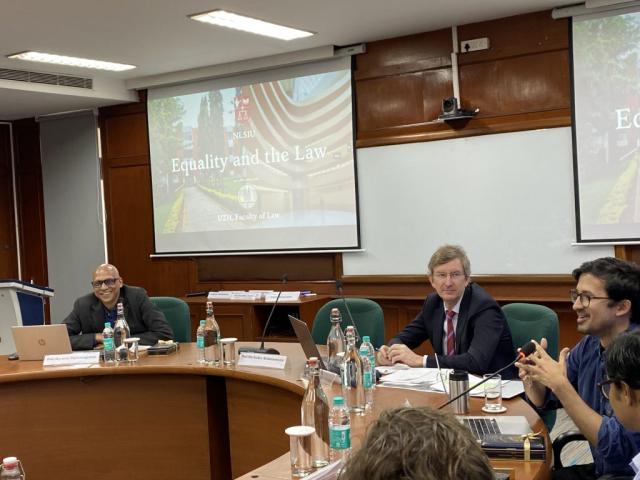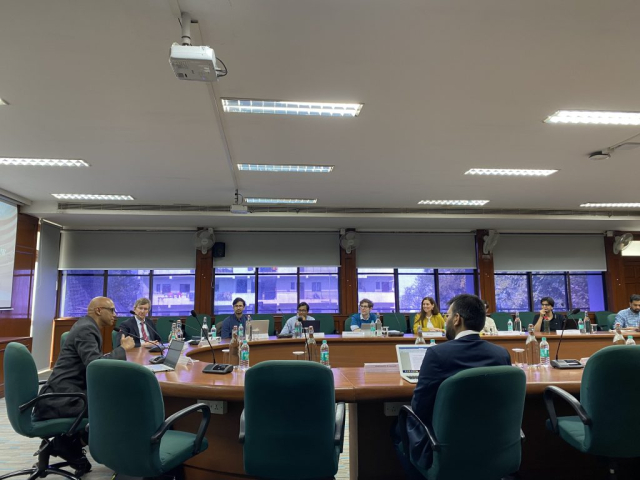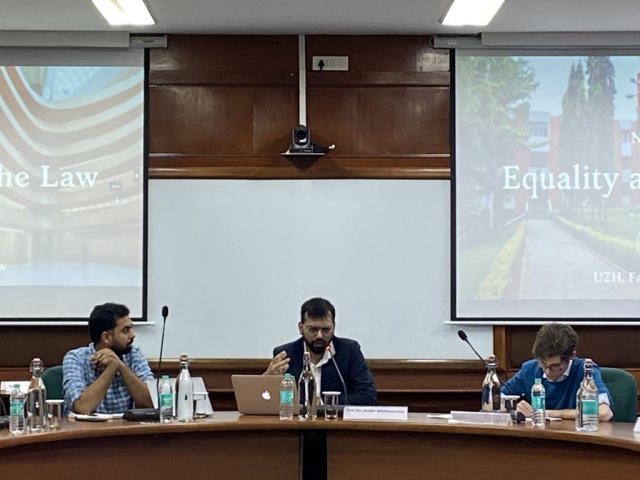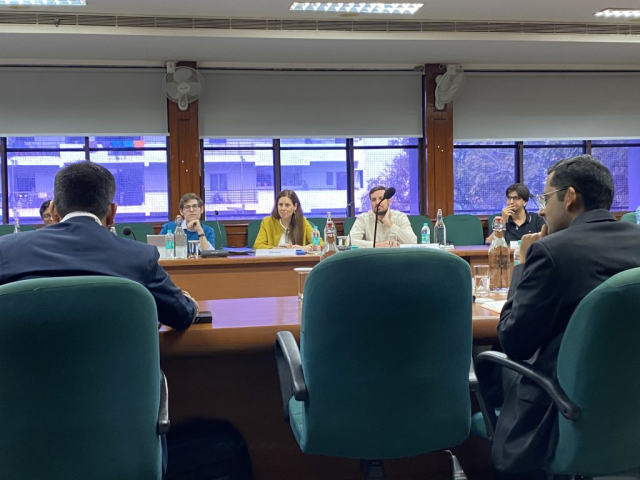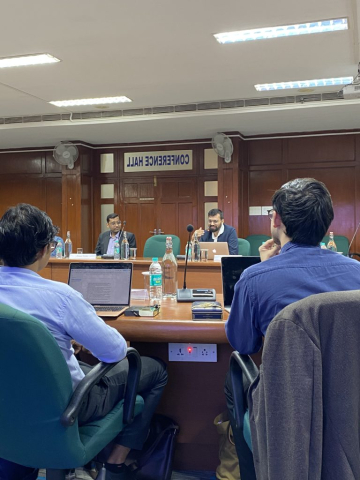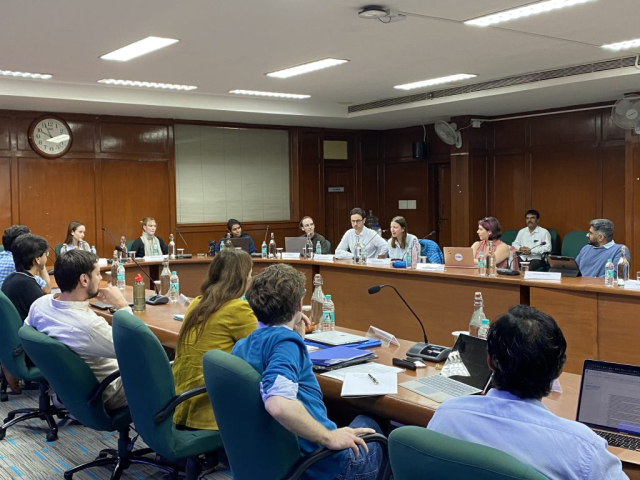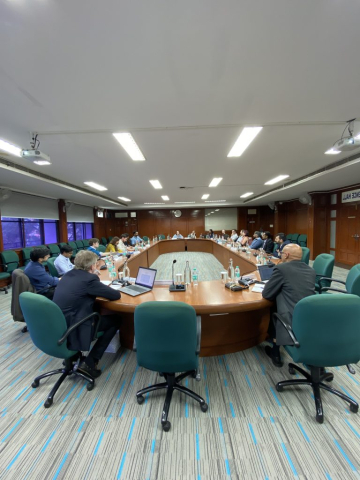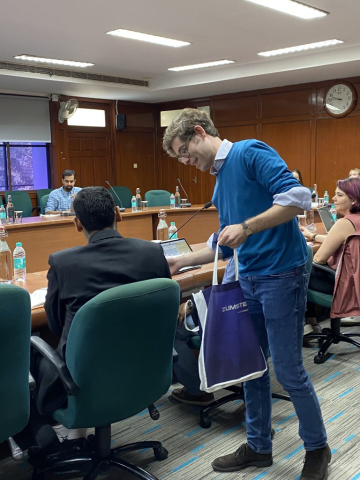Reflections on the ‘Equality and the Law Workshop’ | Organised by NLSIU and the University of Zurich
December 24, 2024
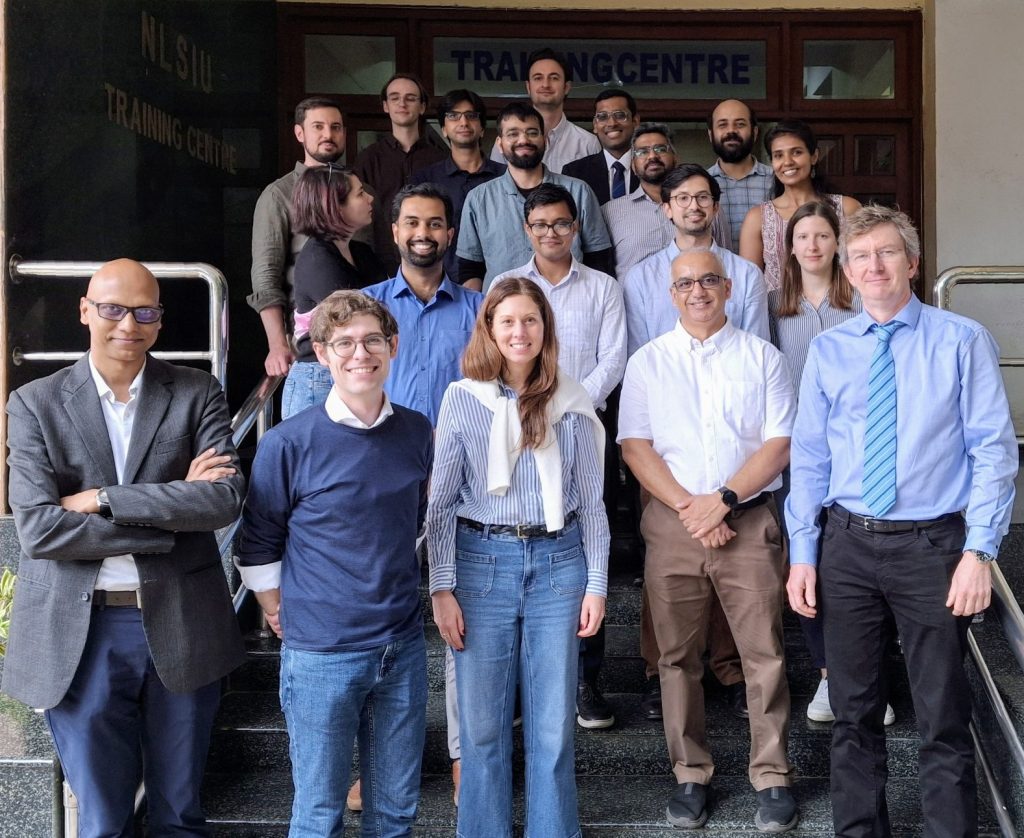 The National Law School of India University (NLSIU) hosted the ‘Equality and the Law’ Workshop in collaboration with the University of Zurich (UZH), Faculty of Law on December 3 and 4, 2024.
The National Law School of India University (NLSIU) hosted the ‘Equality and the Law’ Workshop in collaboration with the University of Zurich (UZH), Faculty of Law on December 3 and 4, 2024.
Conceived by Prof. (Dr.) Matthias Mahlmann, Prof. (Dr.) Sudhir Krishnaswamy and Prof. (Dr.) Arun Thiruvengadam, an intimate closed-door workshop was organised to (a) foster interdisciplinary engagement around problems of equality in the law and (b) catalyse collaboration between NLSIU and UZH early-career scholars.
Theme
Equality is a foundational concept of legal systems. It is a bedrock principle of the rule of law. Equality before the law and the equal application of law are centrepieces of legal system. The legal means to do so are manifold and differentiated.
There is wide ranging and, in many aspects, controversial discussion about what equality means within this general legal framework and in the practice of law. It certainly encompasses formal equality, but it is usually understood to demand more than this formal equality, namely some form of substantive equality. What this means in detail is far from clear and is constantly renegotiated in legal systems. These questions are not only questions of legal system but concern problems that have deep roots in the long reflection about what justice in ethics and politics actually means.
Reflections
Prof. (Dr.) Matthias Mahlmann, Chair of Philosophy and Theory of Law, Legal Sociology and International Public Law, University of Zurich
“Scientific work in all disciplines needs challenges — ideas must be rigorously probed to ascertain their merits. Innovation depends on the possibility of critical, creative thought. The key to reach this aim is international dialogue to develop an understanding of different perspectives and to discover common ground. This workshop provided ample evidence for the significance and the meaningful results of open minded intellectual debate questioning, clarifying and probing the indispensable idea and universal value of equality in different spheres of law.”
Pranav Verma, Assistant Professor of Law, NLSIU
Verma authored a paper titled ‘Bench Constitution and Case Assignments in the Indian Supreme Court,’ that was discussed at the workshop.
“I found the workshop on equality and law to have been a unique platform for early career academics who are in various stages of their doctoral work. It provided an opportunity to early career scholars to present their work-in-progress drafts, test their arguments, and get feedback from their peers. This was particularly helpful since opportunities for such peer-group learnings don’t come by easily for early career academics. The workshop stood apart for me for two more reasons. First, the intimate setting of a limited number of participants made peer connections more organic and free-flowing, as opposed to a larger conference. Second, the format of presentations was innovative for me. The discussant led the presentation by explaining the structure of a paper and raised clarificatory questions; the commentator presented a critique of the paper; and the author only came in at the end to respond. As each author led the discussion on someone else’s paper, it added to the sense of collegiality and collaborative effort to the workshop. I hope to see similar workshops being institutionalised as part of doctoral programs of universities, and the present workshop certainly presents a successful model for the same.”
Jai Brunner, Assistant Professor of Law, NLSIU
Brunner authored a paper titled ‘The Promise of Substantive Equality? Transplanting the Indirect Discrimination Test into India.’
“The diverse range of papers allowed each of us to critically engage with areas of equality law and methods of analysis we were unfamiliar with. Personally, this allowed me to see my own research through several new lenses, which I had not previously considered. Furthermore, the unique format of the workshop – each paper had both a dedicated discussant and commentator – facilitated productive and substantive dialogue. I had a very positive experience and I hope to continue collaborating with the other participants in the months to come.”
Dr. Abhilasha Chattopadhyay, Project Manager, Project on Women’s Leadership in Law
Dr. Chattopadhyay authored a paper titled ‘Conjugality in Crisis: Mediation, Gendered Power, and the Pursuit of Equality in Matrimonial Disputes,’ that was discussed at the workshop.
“The Equality and the Law Workshop exemplified the collaborative spirit that lies at the heart of meaningful intellectual inquiry. The format with dedicated discussants and commentators fostered an environment where we not only engage deeply with each other’s work during the sessions but also continued these dialogues beyond the formal proceedings. This ongoing exchange of ideas is the essence of an enriching educational experience. What made this workshop particularly refreshing was its interdisciplinary nature, bringing together legal scholars and social scientists. This confluence of disciplines offered us varied perspectives on the complex idea of equality, enhancing our understanding of the topic through diverse lenses. It was invigorating to discuss our research, share the challenges of navigating academic spaces across borders, and realize that what connected us most was our shared commitment to rigorous methodologies and critical inquiry.”
Gaurav Dahiya, PhD Candidate, NLSIU
Dahiya authored a paper titled ‘Equality in Patent Licensing: Towards Ensuring Access to Standard-Essential Patents’
“The workshop was a great learning experience for me. Not only to gather feedback on my own research, but also to listen to other researchers and engage with them. It really piqued my curiosity, and left me wishing to read much more on the topics which were discussed. In this way, those two days were extremely fulfilling.”
Matthias Hächler, RA MLaw, MJur (Oxon)
Hächler authored a paper titled ‘Equality, Civic Identity and the Regulation of Private Schools in the Canton of Zurich’ that was discussed at the workshop.
“It was very fruitful also to get a different perspective on what issues of identity formation there are, what private schools play as a role within the educational system, and what they should do. I’m really grateful for this opportunity, not just this workshop, but also to see how life is in different parts of the world and what university academia is like in India. And I really love that whether you’re doing a workshop in Switzerland or in the UK or in India, you have this common ground of the scientific community.”
Dr. Elif Askin, Senior Assistant for Constitutional, Administrative and International Law and Basic Subjects (URPP Equality of Opportunity), University of Zurich
Dr Askin authored a paper titled ‘Feelings towards Law: Societal Occurrence and Impacts on Legal Norms Author,’ that was discussed at the workshop.
“I really liked having this dialogue with colleagues from India. I think the format followed during the conference was great – we had a discussant and a commentator. The discussant presents the paper, and the commentator comments on it, and I would then react to it.”
Nicole Nickerson, MLaw, LL.M. (King’s College London)
Nickerson authored a paper titled ‘Equality: A Problematic Concept? – Decolonial Arguments and Counterarguments,’ that was discussed at the workshop.
“I did a lot of research in Uganda last year, and I had some ideas, which I was not sure how one might view from an Indian context. And I did get really good feedback from the commentators and the discussions. I also loved the informal side of the workshop. If it’s a lot of junior scholars coming together and just sharing their work in progress, ideas don’t have to be perfect. They don’t have to be carefully fleshed out. Workshops like these are a good way to get junior scholars to talk to each other about their work and their struggles.”
Balu G Nair, Assistant Professor of Law
“I was involved in the workshop both as an organiser and as a participant. My experience was rewarding on both the counts: as one of the organisers, I was able to view from close quarters the evolution of a great idea of intensive participation translate into tangible results for early career scholars. As a participant, I had the pleasure of going through a number of thought provoking papers and commenting on them. A few ideas in particular have stayed with me from the workshop. While at one level, many of the papers sought to re-examine some of the seemingly fundamental notions associated with equality, Prof. Mahlmann reminded us how it is important to continue having clarity and agreement over these foundational ideas, irrespective of the jurisdiction.”
Prof. (Dr.) Arun Thiruvengadam, Professor of Law and Chair, Doctoral Council at NLSIU
“This workshop was an experiment, but one that seems to have worked well. Professor Mahlmann and I have been discussing for many years ways to bring scholars together to build a sense of comity at a time when conversations across cultures are becoming more difficult to conduct because of all kinds of barriers that are rising up in our world. We are fortunate that both of our home institutions have been supportive of our attempts. We hope to replicate this in 2025 with a similar workshop in Zurich. We will continue to think of ways to enable such exchanges of ideas including within the MoU between our two home institutions. In future editions we will strive to bring together people from more diverse backgrounds, including non-legal scholars and members of civil society groups.”


